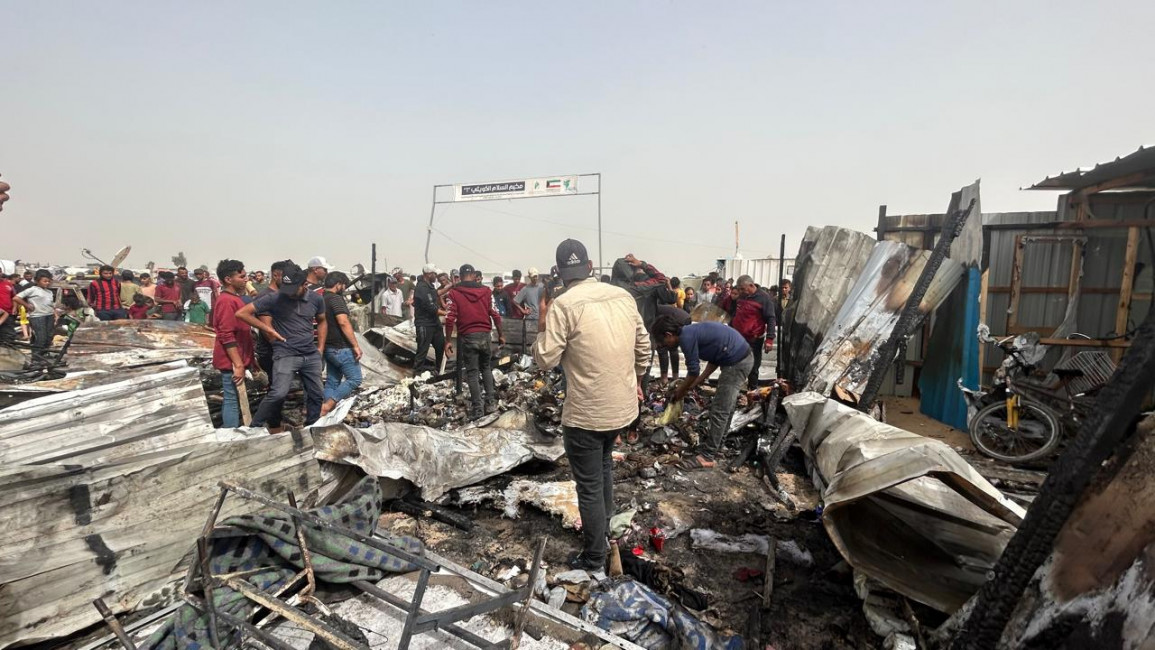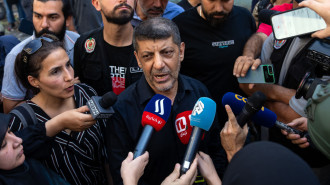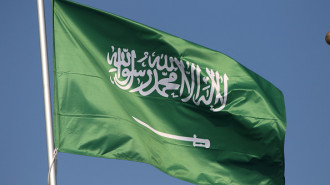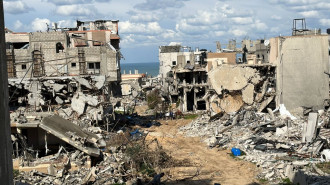'This was no mistake': Survivors of Israel's 'tragic mishap' in Rafah recount horror and flames
It's been four days since Monday's Israeli air strike on a displacement camp in the north of Rafah burned at least 45 people alive, most of whom were women and children. On the face of Samir Abu Al-Sabh, 62, traces of shock still linger as he sits idly on a small chair in the middle of his burnt-down shed, where he narrowly escaped death. He eyed the charred luggage and the remnants of a meal which a family was having when the tragedy unfolded.
"I was sitting in a makeshift shed made of tin, waiting for dinner when I heard the sound of two successive explosions," Abu Al-Sabh recounted the night of the strike to The New Arab, adding, "The place was immediately set ablaze, and the fire exceeded three metres high. I tried to escape, but the door led directly to the blazing fire, so I rushed in the opposite direction, but my strength failed me and I couldn't escape without assistance."
Abu Al-Sabh found himself surrounded by flames. He called for help from those outside, until one of his relatives heard him and tried to make a dent in the tin. He was miraculously saved. The fire quickly caught onto the nylon and fabric refugee tents, rapidly consuming the camp and its people.
Having made it outside his shed, he saw people burning alive and corpses scattered all over.
The attack, which Gaza's Health Ministry said has killed 45 people, including at least 23 women, children, and elderly people, with three unidentified bodies that were completely charred, in addition to 249 wounded, was described by Israel’s Prime Minister Benjamin Netanyahu as a "tragic mishap". His country, he said, will look into the circumstances leading to the civilians' death as the army went after two Hamas operatives in the strike. There was "no intention to target civilians," said the Israeli premiere, whose claims were outright refuted by witnesses and survivors speaking of indiscriminate and intended assaults in the open-air camp.
Abu Al-Sabh, who worked as an English teacher in UNRWA schools before his retirement, reiterated that the camp is "visibly identified as a displacement camp, and there is nothing inside that could be harmful to Israel."
Displaced with his wife, his eldest son, his grandchildren, his siblings, and other family members from Gaza's central Bureij camp to Rafah in the south, Al-Sabh spoke of a displacement camp he had come to learn by heart since he moved in on 4 January.
Much of it had been turned into rubble, most of it reduced to ashes after the Israeli attacks.
"We are all civilians displaced from multiple areas and the targeted place is the same. The entire area is made up of tents for the displaced, extending as far as the eye, and there are no Palestinian factions here," he added.
Screams and horror
Graphic videos online, showing a sight akin to a furnace, or of charred bodies and decapitated children from the night of the strike, sparked an uproar over the indiscriminate attack against civilians in a place initially designated as safe, and renewed pressure on Israel to terminate its ground operation in the refugee-packed city of Rafah. Despite a court order from the International Court of Justice, and repeated warnings from the US to Israel not to push ahead with the military operations on the city, Netanyahu and his cabinet argue the move is a must to eradicate Hamas.
"We were reassured that we were in a safe area, and we were moving forward with our lives normally, like the rest of the tormented displaced people," Abu Al-Sabh said. "But no one is spared."
Holding a leaflet that the Israeli army had dropped over their heads months ago, advising them to relocate to Rafah as a "safe zone", Abu Al-Sabh pointed at the recently bombed camp that was initially promised to be a safe place.
"In this safe zone, there were screams of people trapped inside the camp, set on fire alive, as they desperately pleaded for help. The subsequent intense ignition of fire prevented the displaced people surrounding the place from being able to enter it, except for some adventurers who succeeded in pulling a number of the displaced people from the midst of the fire," he recalled. "But it was too late, as most of them had died."
Since the start of the military operation in Rafah on 6 May, some one million people have fled the city, according to the UNRWA. The flow of aid into Gaza has also significantly shrunk as a result of the incursion, signifying a potential threat of mass starvation.
"How could they bomb us so brutally?" Abu Al-Sabh asked, nonplussed.
'This was no mistake'
Challenging Israel’s claims of the camp harbouring Hamas fighters, Haseeb Ahmed, a survivor of the Israeli strike, said “the camp in its entirety is open to the public and not covered, you can easily see what is happening inside. The area is nothing but sandy hills and is crammed with displaced people. It is impossible to employ it geographically for aggression against Israel”.
Of the airstrikes' aftermath, the 33-year-old spoke of the corpses scattered, of women and children, and bodies were torn apart and hardly identifiable. Yet, with nowhere else to go, and since his tent was spared the damage, he said he’ll remain in the camp.
Meanwhile, Talal Salman, was packing the little he has ahead of another displacement journey. In between packing, the 65-year-old, quietly scrutinised the place, unable to fathom the scale of the devastation.
Displaced from Beit Lahia in the northern Gaza Strip early in November, he said he’s done his part of seeking Israel-designated safe locations for him and his family.
"I was sitting in my tent, adjacent to the bombed place, when the deafening and heart-wrenching sound of explosions came," Salman recalled. Upon hearing the Israeli bombs, he left his tent running around, terrified and panicked, in search of his children, whom he instantly found and quickly fled with to a nearby sandy hill seeking protection from the bombings.
Challenging the Israeli account, supported by the US, of calling the strike a "tragic mishap", Salman said, "This could not be a small bomb that Israel mistakenly threw at us, as America Trembling." Salman uttered.
"There is no safe place in the Gaza Strip. We will now move to Khan Yunis as we escape the bombing for the fifth time, but if we survived the previous times, will we survive the next one?" Salman uttered. Then he shook his head and said, "Not guaranteed."
"I moved from north to south, and now we are moving from the south in reverse to Khan Yunis. What happened here confirms that the Israeli army is targeting our existence as human beings."
"Is it possible that the world believes their stories and denies these horrific scenes?" Salman wondered.
This article is published in collaboration with Egab.

![Samir Al-Sabh, a survivor of the Rafah attack, has kept the leaflet which drove him out of his home months ago, and which clearly said that they must go to the 'safe' city of Rafah. [Mohamed Solaimane/TNA]](/sites/default/files/styles/large_1_1/public/2024-05/Samir%20Al-Sabh%2C%20a%20survivor%20of%20the%20Rafah%20attack%2C%20has%20kept%20the%20leaflet%20which%20drove%20him%20out%20of%20his%20home%20months%20ago%2C%20and%20which%20clearly%20said%20that%20they%20must%20go%20to%20the%20_safe_%20city%20of%20Rafah.%20Image%20by%20Mohamed%20Solaimane.jpg?h=c673cd1c&itok=NDfhgc0E)






 Follow the Middle East's top stories in English at The New Arab on Google News
Follow the Middle East's top stories in English at The New Arab on Google News


